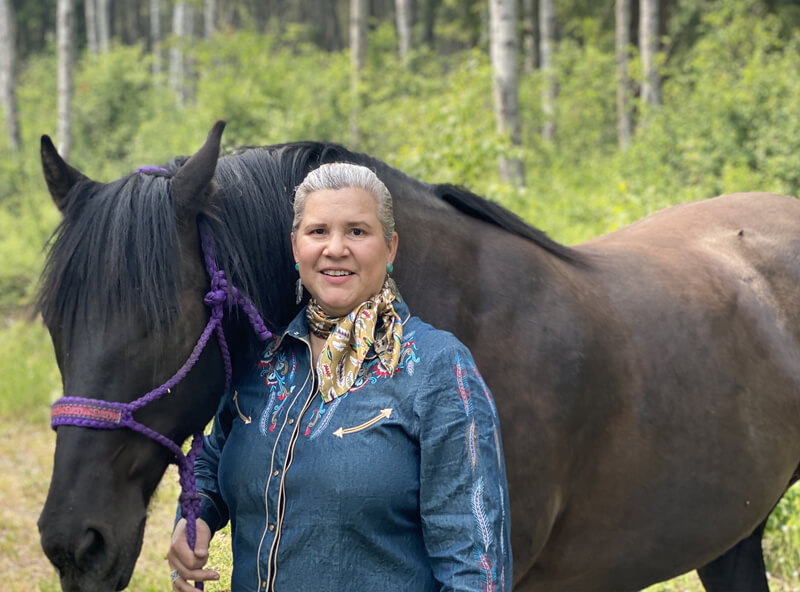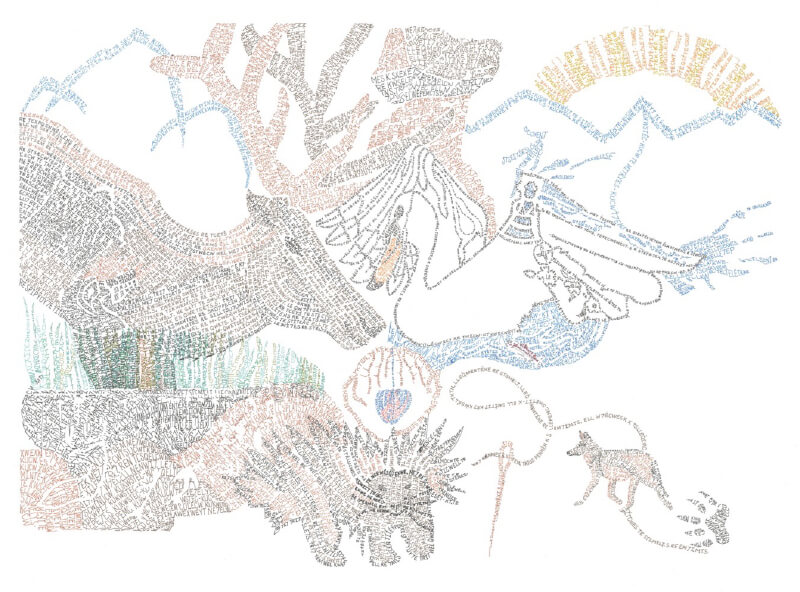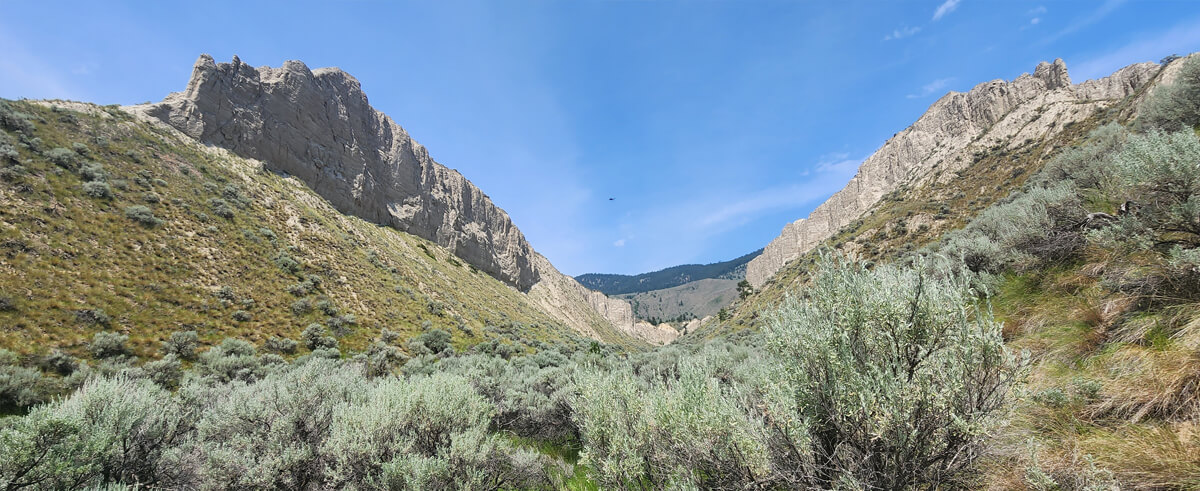Skú7pecen’s Journey
“Skú7pecen re Stseptékwlls is Secwépemc law,” explains Sunny LeBourdais, Director of Transformation for the Qwelmínte Secwépemc. “It ordains how we work together in times of uncertainty.”
In this story, as told in 1900, it is said that two peoples lived in conflict with one another. Their Chiefs were Elk and Swan. They were interfering with each other’s business leading to difficulties in putting away food and living in peace.
What one group did well, the other group did poorly, and because of this, the people suffered and were pitiful.
Skú7pecen’s Journey has been adopted by the provincial government and Qwelmínte Secwépemc to chart a path to restoring right governance and fiscal and territorial relations.

Walking on two-legs
Qwelmínte Secwépemc is an organization working under the direction and tutelage of eight Secwépemc communities. In April 2022, Qwelmínte Secwépemc and the provincial government signed Skú7pecen’s Journey Letter of Commitment (LoC) towards a Recognition and Reconciliation Agreement.
LeBourdais says “We are working with B.C. under the principle of ‘walking on two-legs’ and that means upholding respect and equity for Secwépemc and Western worldviews in all of our deliberations,” and LeBourdais feels that now, more than ever, the Province needs Indigenous worldviews, teachings, and ideas.
It was the creator’s work
Qwelmínte Secwépemc leaders prioritized forestry discussions with B.C. due to the impact of wildfires, floods and climate change in their territories and were penning a forestry transformation agreement based on Skú7pecen’s journey through the Earth World when B.C. announced their intention to transform the FCRSA (Forest Consultation and Revenue Sharing Agreements).
The Province set a two-year timeframe for the work, along with an immediate 5% increase in revenue sharing ($63 million 2022/2023). The increase meant that First Nations share increased from 3, 4 or 5 % to 8, 9, or 10 %.
She says it’s no accident that engagement on the new fiscal framework arose when it did.
“It was the creator’s work,” said LeBourdais. “We were already sharing information and discussing the challenges of FCRSA, so we dove right in.”
LeBourdais describes the FCRSA model as problematic. “It’s antiquated, arose from a court case, and continues to infringe our rights. When we heard the Province was looking to transform FCRSA as part of a new fiscal framework, we wanted to be a part of fixing it.”
A new fiscal framework– Two tracks of change
Revenue derived from resource development supports provincial and federal governments to deliver programs and services and First Nations governments have a similar need for revenue to deliver programs and services to their members and to make decisions about their lands and territories.
The Province has committed to a new fiscal framework that will shift from transactional, ad hoc, or short-term arrangements with First Nations to an ongoing and predictable framework.
“Getting into right relations with BC First Nations is a priority” said a subject matter expert from the Ministry of Indigenous Relations and Reconciliation, who goes on to describe two tracks of change needed to get there: high-level new fiscal framework visioning, and near-term changes (initially, forestry revenue-sharing).
Track one is about the big picture as set out in the Declaration Act Action Plan: Co-develop with Indigenous Peoples a new distinctions-based fiscal relationship and framework that supports the operation of Indigenous governments, whether through modern treaties, self-government agreements or advancing the right to self-government through other mechanisms.
While discussions have started toward this larger framework, provincial representatives and First Nations continue to reckon with the complexity of multiple valid worldviews and sources of law that must coexist to manage resources and the value they generate.
The second track, dubbed near-term changes, is sector-based and intended to test the principles being developed in track one, as well as fixing immediate problems. The replacement of the FCRSA is an example of this approach.
The ministry’s subject matter expert says that reimagining revenue sharing is a transformative step. “Historically, the provincial and the federal governments have been the ones making decisions about how lands and resources create value for the Crown. Non-Indigenous people have largely been seeing the benefits of that economic activity and resource development.”

Skú7pecen brings the people together
It was Skú7pecen (Porcupine) who brought the two People together.
“When it comes to the new fiscal framework, it quite honestly is one of the biggest opportunities for us as Indigenous people,” says LeBourdais. “It’s about the recognition of the undeniable economic component of Aboriginal title.”
The Qwelmínte Secwépemc First Nations are among of the 90+ First Nations communities and organizations the province has engaged with on the framework so far. The organization has been meeting monthly with B.C. and has dedicated hundreds of hours of staff time.
LeBourdais says that “The reality of what it has taken us to engage in this process so deeply is that we would never have the capacity to do this across the multitudes of provincial engagements that are out there and ongoing right now.”
The foundational issue of the current fiscal framework is that it doesn’t adequately fund key governance activities of First Nations, including engagement with the Province and other levels of government, explains LeBourdais. “We have chosen to work closely with the Province and other First Nations to co-develop the new fiscal framework which is intended to reset this fiscal relationship and properly provide for the responsibilities of First Nations governments.”
“Quite honestly it is a bit scary too right, because there’s a fear, what if you forget something? What if you didn’t think of something? To be on the cutting edge of a blade means that you are in a position to have impact for so many. You carry that responsibility very seriously and very heavily, right? Because a misstep could have such large implications as well.”
The Province faces their own challenges when it comes to co-development.
“I don’t know that we know how to do co-development very well yet,” says the ministry subject matter expert. “This is hard work and we need to be adaptable and open-minded as we create a future that is better than the past.”
The People humble themselves
Swan and his relatives knelt before Elk. Swan shared his wisdom with them and told them how they could fix one another. This is how he gave Elk all his knowledge. Then Elk and his relatives knelt before Swan and Elk shared all his thoughts and his advice. And this is how they learned from one another, and they were able to look after one another…
LeBourdais says that “A lot of the times, our two worlds are so different when it comes to this concept of economy. One of the hardest things is knowing that Secwépemc Tmícw (land) is starting with a balance sheet that’s in the red. Our territories are so hurting right now. We are seeing the impacts from drawing on trees – from taking and taking. A new fiscal framework is bigger than money. It’s the landscape. It’s sharing the responsibility and access for resources in a way that’s going to be sustainable.”
The ministry’s subject matter expert agrees, “This is about moving forward in a good way where we bring Indigenous and non-Indigenous worldviews together to create a future that works for everyone. This framework will respect First Nations’ worldviews, and their rights to make and participate in decisions about their lands, waters and resources and will help us work together to make decisions about lands and resources, both vital aspects of our economies.”
Skú7pecen’s journey is far from over, but their teaching provides the vision, the end-state that is so important when undertaking transformational work.
When the People humbled themselves and shared their knowledge, they were able to learn from one another and consequently lived in peace and prosperity.
“We are working with B.C. under the principle of ‘walking on two-legs’ and that means upholding respect and equity for Secwépemc and Western worldviews in all of our deliberations.”

